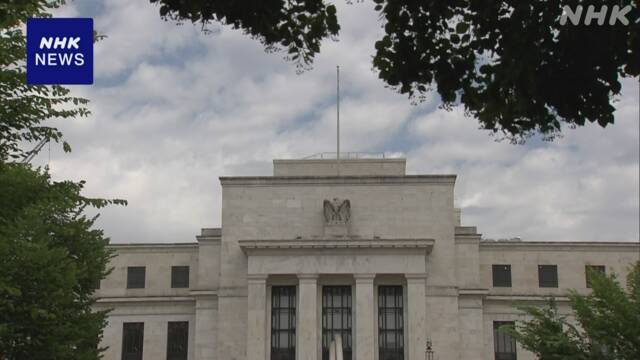The US Fed = Federal Reserve Board will hold a meeting to decide monetary policy for two days from the 12th. With inflation slowing down, the market is increasingly expecting the Fed to hold off on raising rates for the third consecutive meeting, and interest is focused on how much it will cut next year.
In the United States, the consumer price index rose by 10.3% in October compared to the same month of the previous year, and the growth was reduced from 2.3% in the previous month.
Against this backdrop, the Federal Reserve will hold a two-day meeting starting on the 7th to decide on monetary policy.
The market is increasingly betting that the Fed will hold off on raising interest rates for the third consecutive meeting in light of recent economic data and recent reports of a slowdown in the economy.
In addition, participants will present their forecasts for the policy rate at this meeting, and the market will be interested in how much the Fed expects to cut rates next year.
In the previous outlook in September, assuming a range of fluctuations in the policy rate of 12.2 percent per session, the Bank would raise interest rates once more this year and cut rates twice a year next year.
The focus will also be on what Chairman Powell will say at the post-meeting press conference on his stance on monetary policy going forward.
The Future of Monetary Policy Asks the Former Vice Chair of the Fed
We asked Alan Blinder, former vice chairman of the Fed of the United States and professor at Princeton University, about the points of interest of the meeting to decide monetary policy to be held for two days from the 12th and the future course of monetary policy.
Q. There is widespread speculation in the market that interest rate hikes will be stopped, but does Chairman Powell want to avoid declaring the end of inflation?
A. I know Chairman Powell very well, but he is a very cautious person. I think the probability that the Fed is on the last path toward achieving the 2% inflation target is quite high, but it is still uncertain and not 100%. The market is like sitting on the edge of a knife, ready to move either way as Powell speaks. That's why he needs to be cautious, and I think that's his natural way of doing things.
Q. The market seems to be taking advantage of Chairman Powell's remarks.
A.Judgment is always subject to mistakes. The market tends to focus too much on what the Fed's non-central Fed presidents and board members have to say. Of course, the opinions of the board members should not be ignored, but they should be greatly discounted. Powell has tried to persuade the market many times in the past, but in some cases the market has mistaken his words. These examples are infrequent, but they do happen occasionally.
Q. What are the differences in thinking among the members of the Fed?
A. Since August, Fed members have become increasingly divided. However, I don't think anyone in the monetary policy meeting thinks that the Fed should cut interest rates right now, and I think there is a strong consensus that the Fed will not raise rates for a while.
A.I think that's a little early. Recall that when the market predicted that interest rates would fall by December 2023, I told many people that it was unrealistic. Similarly, a rate cut in early 2024 is virtually unlikely. On the other hand, depending on macroeconomic and inflationary developments, there is a possibility of a rate cut in the first half of 2024. But if I were to make a bet, I would bet on a rate cut in the second half of 2024.
Q.What is the risk of a resurgence of inflation?
A.I think it's unlikely, but I can't deny it. There are two reasons for this. The first is the price of crude oil. Given what's happening in the Middle East, what's happening in the middle of Europe, no one knows what oil prices will be like next year. The other is the interaction between productivity growth and wages and prices. Productivity growth, which has an impact on wages and prices, has been swinging positively and negatively since the pandemic, making it unpredictable. In the long run, the trend of inflation will change depending on productivity growth.
Q. Can the Fed bring inflation down to the 2% target without falling into a recession?
A. A year ago, I would have said it was unlikely, but many economic indicators show that inflation is slowing in a way that is not accompanied by a recession. The tight labor market is easing, and economic growth is unlikely to continue above trend. There is room for the U.S. economy to slow down, but the Fed may be able to achieve a soft landing.

